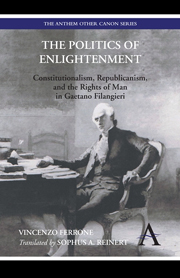 The Politics of Enlightenment
The Politics of Enlightenment from Part Two - A Difficult Legacy
Published online by Cambridge University Press: 05 February 2013
There is a general constitution for all societies, which consists of the union of all their wills… [it] consists of two fundamental principles. First, the union of their wills aiming at the conservation of the natural rights of each; secondly, the way of reuniting those wills and strengths and of exercising them.
F. M. Pagano, Saggi politici, II ed. (1792–93)It is well known that the expression and concept of ‘Enlightenment constitutionalism’ does not exist in current historiography. Given that the language of historiography until recently also lacked the concept of Old Regime constitutionalism, this should not be particularly surprising. Still, it seems very difficult not to employ it, or some similar term, if one really wishes to understand the deeper structures, nature, and true message of the Scienza della legislazione. The concept of Enlightenment constitutionalism of course has to be explained and its meaning specified beginning from its historical context, that is the crucial period between the two great revolutions, the American and the French, as well as the novel elements which characterized the most important parts of that grandiose project. This is what the previous chapters tried to do, examining decisive questions like the umpteenth metamorphosis of natural law brought about by Enlightenment thinkers who put the question of human rights at the core of the political debate of the late eighteenth century, and by exploring the unexpected consequences of that increasingly tangled nexus between rights to liberty and the principle of equality for ways of thinking about politics, morality, and religion.
To save this book to your Kindle, first ensure no-reply@cambridge.org is added to your Approved Personal Document E-mail List under your Personal Document Settings on the Manage Your Content and Devices page of your Amazon account. Then enter the ‘name’ part of your Kindle email address below. Find out more about saving to your Kindle.
Note you can select to save to either the @free.kindle.com or @kindle.com variations. ‘@free.kindle.com’ emails are free but can only be saved to your device when it is connected to wi-fi. ‘@kindle.com’ emails can be delivered even when you are not connected to wi-fi, but note that service fees apply.
Find out more about the Kindle Personal Document Service.
To save content items to your account, please confirm that you agree to abide by our usage policies. If this is the first time you use this feature, you will be asked to authorise Cambridge Core to connect with your account. Find out more about saving content to Dropbox.
To save content items to your account, please confirm that you agree to abide by our usage policies. If this is the first time you use this feature, you will be asked to authorise Cambridge Core to connect with your account. Find out more about saving content to Google Drive.